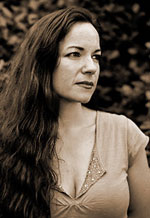Tomaz Salamun, “Fiery Chariot”
The bull’s berry walks on wires.
The windowpanes are wounds.
They hiss when the jet streams from the silver
kettle and a giant flings a discus.
It turns its head. The helmet touches the tip.
From Woods and Chalices, the most recent collection of Salamun’s poetry translated into English (often by the poet himself) from the Slovenian. Three more poems from this collection, co-translated with Brian Henry, were published in Conjunctions. The two of them will be reading at NYU Thursday night.
You can also read Charles Simic’s translation of “Folk Song,” a version of “My Little Head, My Darling, I Love You” by Salamun and Joshua Beckman, and the marvelously self-referential “History,” co-translated by Bob Perleman.
8 April 2008 | poetry |
Beth Ann Fennelly, “I Provide for You, Boy Child, Like God”

and like God, I will cast you out.
Your eyes blue as a drowned thing.
Your harshest lesson:
you are no part of me.Learning that
will cost you ages in whichyour eyes take on the human color: grief.
Coming to words won’t even help you
name your suffering.You will embrace
false idols.Yet those women can let you
back in that primal crawl spaceno more than I can.
From Unmentionables, Fennelly’s fourth collection, which she read from today in Alabama. You can hear Fennelly reading from “The Kudzu Chronicle,” one of the longer poems in this book, accompanied by a short animated film.
Other Fennelly poems online include “The Impossibility of Language,”Once I Did Kiss Her Wetly on the Mouth,” and “I Should Be More French. Or Japanese.“
In an essay for the Academy of American Poets, Fennelly wrote of the act of writing poetry, “What exactly is happening in our brains when we cease to become conscious of time? We are narrowing the aperture of our concentration to condense and magnify its power. We forget the daily distractions and enter into the poem so deeply that a more radical forgetting take place—the forgetting of fossilized languages that lead to writing, and thinking in, clichés.”
(Fennelly was a year behind me at Notre Dame, but I don’t think we ever really ran into each other while we were there.)
2 April 2008 | poetry |

 Our Endless and Proper Work is my new book with Belt Publishing about starting (and sticking to) a productive writing practice.
Our Endless and Proper Work is my new book with Belt Publishing about starting (and sticking to) a productive writing practice. 
